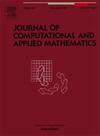求解弱奇异Fredholm积分方程的混合径向核:无网格方法的平衡精度和稳定性
IF 2.6
2区 数学
Q1 MATHEMATICS, APPLIED
Journal of Computational and Applied Mathematics
Pub Date : 2025-06-18
DOI:10.1016/j.cam.2025.116848
引用次数: 0
摘要
在过去的几十年里,基于核的近似方法在解决科学和工程领域的各种问题方面取得了惊人的成功。然而,当采用直接或标准方法使用无限光滑核进行计算时,在理论上可以达到的精度与数值稳定性之间会产生冲突。换句话说,当形状参数趋于零时,具有无限光滑核的标准基的运算矩阵变得严重病态。这种冲突可以通过应用混合内核来管理。混合核扩展了近似空间,并提供了高度的灵活性,以达到精度和稳定性之间的最佳平衡。本文提出了一种利用混合径向核(HRKs)在无网格格式下求解第二类弱奇异Fredholm积分方程的创新方法。该方法采用建立在分散节点上的混合核作为离散配置技术的基础。这种方法将所研究的问题转化为线性代数方程组。同时,利用粒子群优化(PSO)算法,以最大绝对误差(MAE)最小为目标,计算混合核的最优参数。我们还研究了所提方案的误差估计。最后,我们通过各种数值实验来评估混合技术的准确性和有效性。数值结果表明,混合核估计在求解WSFIEs时的精度明显高于纯核估计。此外,杂化基在不同的形状参数值下都保持稳定。本文章由计算机程序翻译,如有差异,请以英文原文为准。
Hybrid radial kernels for solving weakly singular Fredholm integral equations: Balancing accuracy and stability in meshless methods
Over the past few decades, kernel-based approximation methods had achieved astonishing success in solving different problems in the field of science and engineering. However, when employing the direct or standard method of performing computations using infinitely smooth kernels, a conflict arises between the accuracy that can be theoretically attained and the numerical stability. In other words, when the shape parameter tends to zero, the operational matrix for the standard bases with infinitely smooth kernels become severely ill-conditioned. This conflict can be managed applying hybrid kernels. The hybrid kernels extend the approximation space and provide high flexibility to strike the best possible balance between accuracy and stability. In the current study, an innovative approach using hybrid radial kernels (HRKs) is provided to solve weakly singular Fredholm integral equations (WSFIEs) of the second kind in a meshless scheme. The approach employs hybrid kernels built on dispersed nodes as a basis within the discrete collocation technique. This method transforms the problem being studied into a linear system of algebraic equations. Also, the particle swarm optimization (PSO) algorithm is utilized to calculate the optimal parameters for the hybrid kernels, which is based on minimizing the maximum absolute error (MAE). We also study the error estimate of the suggested scheme. Lastly, we assess the accuracy and validity of the hybrid technique by carrying out various numerical experiments. The numerical findings show that the estimates obtained from hybrid kernels are significantly more accurate in solving WSFIEs compared to pure kernels. Additionally, it was revealed that the hybrid bases remain stable across various values of the shape parameters.
求助全文
通过发布文献求助,成功后即可免费获取论文全文。
去求助
来源期刊
CiteScore
5.40
自引率
4.20%
发文量
437
审稿时长
3.0 months
期刊介绍:
The Journal of Computational and Applied Mathematics publishes original papers of high scientific value in all areas of computational and applied mathematics. The main interest of the Journal is in papers that describe and analyze new computational techniques for solving scientific or engineering problems. Also the improved analysis, including the effectiveness and applicability, of existing methods and algorithms is of importance. The computational efficiency (e.g. the convergence, stability, accuracy, ...) should be proved and illustrated by nontrivial numerical examples. Papers describing only variants of existing methods, without adding significant new computational properties are not of interest.
The audience consists of: applied mathematicians, numerical analysts, computational scientists and engineers.

 求助内容:
求助内容: 应助结果提醒方式:
应助结果提醒方式:


